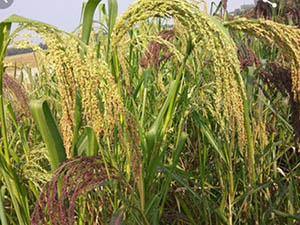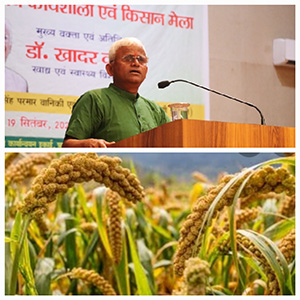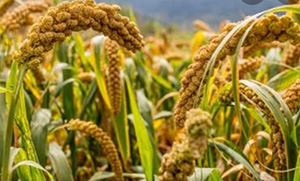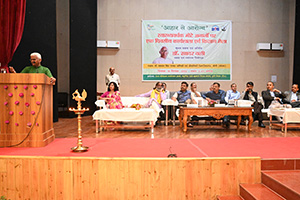SHIMLA/SOLAN: Dr Khadar Vali, known as 'Millet Man of India', today made a fervent call to farmers and all other stakeholders to bring millet back to kitchen for its promotion to save water, soil, environment and human health in the state and in the country as a whole.
Once a pride of pahadi kitchens across Himachal, Uttarakhand and other Himalayan states, Millets known in vernacular as koda, Kawani, Chinai, chaullai, kathu bathu and the like, have almost vanished from the hills with the advent of horticulture and vegetable and other cash crops.
These plants now rarely survive in the remote pockets of hill like Dodra Kuar, Kupvi in Shimla and some pockets in Mandi, Kullu, Chamba, Sirmaur and some areas in Uttarakhand.
But millet man of India has rekindled the hopes for revival of millets in the hills which is not only essential for healthy lifestyle and healthy soil, but also for nutrition and food security for the hill folks in the mountains.
Speaking at a Workshop and Kisan Mela on natural farming scheme at Dr YS Parmar university of horticulture and forestry at Nauni Dr Valli sets tone for strategy on millets in Himachal Pradesh ahead of International Year of Millets-2023.
Dr Khadar Vali called upon the farmers, agriculture scientists and policy makers to promote millets in agriculture to save soil, water, environment and, above all, human health.
“Let us bring the millets back to our kitchen, make them an essential part of our staple diet plan and say goodbye to the emerging health problems,” he exhorted.
Internationally renowned food and nutrition expert from Mysore, Dr Vali delivered a special lecture on the role of millets in preventive health- Aahar Sey Arogya- at this workshop.
The event was organized by the State Project Implementing Unit (SPIU) of Prakritik Kheti Khushhal Kisan Yojana of Himachal Pradesh government.
Over 200 farmers from Himachal Pradesh, who have adopted non-chemical, low cost and climate resilient natural farming after the launch of natural farming scheme in 2018, participated in it along with PK3Y officials from the state, agriculture department officers, agriculture and horticulture scientists and students .
Dr Khadar Vali advocated against growing and eating wheat and rice and asked the farmers to start cultivating the 'forgotten food' millets again.
“The water required for rice and wheat crops in one year equates with water requirement of millets for 26-30 years”.
“This single reason is good enough for scientists and farmers to have shifted to the cultivation of millets," he said.
He said it is known that if we want to save soil and check its degradation, we need to plant C4 grasses. “Millets are C4 plants.
But on one hand, we are trying to save soil, environment and water, and on the other hand, we are promoting C3 plants like wheat and rice, which are degrading and depleting them, he asserted.
How can we talk about biodiversity without millets? he questioned.
The food and nutrition expert categorically held that the issue has been neglected by the Agriculture Corporate Food Factory Culture, who are controlling the food and food habits.
Dr Vali said whether it is glucose imbalance, hormonal imbalance, microbe imbalance, the humans have been facing various health problems with each passing day due to the 'economic model' being followed by society.
Dr Vali said he has done major work on millets, what he calls 'Panch Ratna', including Foxtail millets, Browntop millets (Kawni in Himachal), little millets, Kodo (Koda in Himachal) millets and Barnyard millets.
He said the barren lands could be rehabilitated with natural farming of millets.
He said his experiments have shown that eating millets can not only help prevent diseases, but can help the patients manage better in the progressive diseases with improved indicators.
“This is not a magic. It is a perfect science of millets, which are real foods for healthy living," he said.
Dr Vali said millets are the first domesticated grass and added that there is need for an awareness drive on the benefits of millets.
Secretary Agriculture, Rakesh Kanwar said the International Year of Millets-2023 is a great chance to make a beginning on millets.
“A discussion at this workshop will help us in a paradigm shift in policy on agriculture,” he said.
He requested Dr Vali to be mentor for the Millet Working Group in HP.
Vice-Chancellor of Nauni University, Prof Rajeshwar Singh Chandel said the University will play its role significantly in the action plan to be prepared by the Working Group on millets for the state.
The workshop was followed by a meeting of the working group of agricultural experts of state to chalk out a strategy for promotion of millets in Himachal Pradesh.
State Project Director, P3KY Naresh Thakur and Director, Agriculture, Dr BR Takhi also spoke on the importance of millets.






